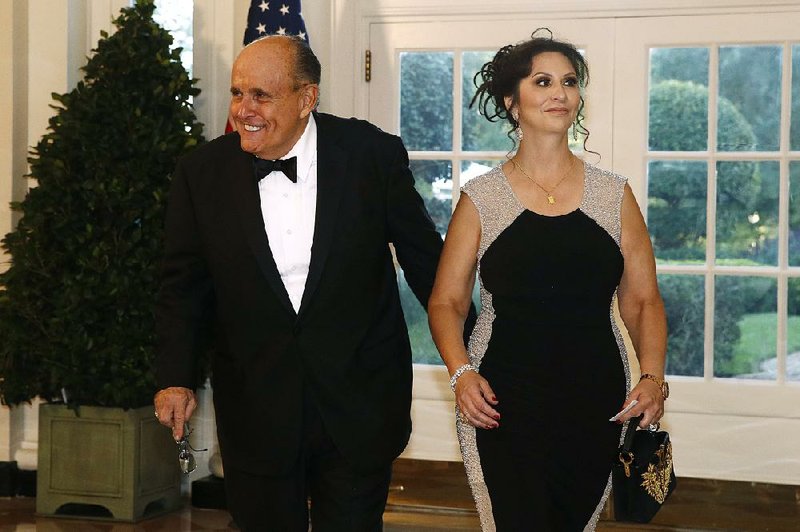LONDON -- Associates of a Ukrainian oligarch fighting extradition to the U.S. were working to dig up dirt on former Vice President Joe Biden last summer in an effort to get Rudy Giuliani's help in the oligarch's legal case, according to three people familiar with the exchanges.
Dmitry Firtash, charged with conspiracy by the U.S. and living in Vienna, shuffled lawyers in July to add Joe diGenova and Victoria Toensing, two supporters of President Donald Trump who had worked with Giuliani. Around that time, some of Firtash's associates began to use his broad network of Ukraine contacts to get damaging information on Biden, the people said.
DiGenova and Toensing have billed Firtash about $1 million for their work, one of the people said. That includes costs for Lev Parnas, a Giuliani associate, as a translator and important contact, the person said. Parnas was arrested last week along with several associates and accused of conspiring to violate campaign finance laws.
People working on Firtash's behalf collected a witness statement from Viktor Shokin, a former Ukrainian prosecutor general. The statement, dated early September, helped Giuliani renew an assertion that he'd been advancing for months -- that Biden had tried in 2016 to sway Ukrainian politics to help his son. U.S. and Ukrainian officials have disputed Shokin's account.
Shokin, though, had been promised his statement wouldn't be made public, according to the people. Giuliani went on to cite it repeatedly, waving it around on cable news as evidence of Biden's alleged corruption. The Hill and other media outlets provided links to it, with Giuliani later suggesting he had a role in making it public. "This is the affidavit I put out," he said during a Fox News interview this month.
As a result of the publicity Giuliani generated with Shokin's statement, two of the people said they believe the odds of the Justice Department dropping the case against Firtash have plummeted, because it would look like a quid pro quo. Others connected to the case agreed.
U.S. lawmakers conducting a presidential impeachment inquiry are bearing down on whether favors were traded for influence. They are examining Giuliani's efforts to turn up evidence in Ukraine and allegations that the Trump administration withheld crucial aid until the country's president agreed to investigate the Bidens.
It's illegal for American politicians to accept foreign campaign contributions, and, as special counsel Robert Mueller's investigation has laid out, even non-monetary assistance can have a value.
In a statement from his spokesman, Firtash denied having contact with Giuliani.
Giuliani, in a text message, wrote: "I have nothing to do with Firtash case. Never met him and don't know him."
Asked about whether Shokin's statement may have harmed Firtash's chances of getting the case dropped, Giuliani responded, "It would seem to me it should have nothing to do with it. It's either a good case or not."
Toensing and diGenova, a husband-and-wife law team, declined to comment through a spokesman. The Justice Department also declined to comment.
Giuliani was an attractive ally for Firtash. Once renowned for his work as a U.S. prosecutor and a New York mayor, he was a close adviser to Trump and became his personal lawyer in April 2018. He also brought extensive contacts in Republican-leaning legal circles.
A Ukrainian industrialist with natural gas interests, Firtash was looking to get out from under five years of legal headaches in the U.S. Federal prosecutors have accused him of corruption and racketeering conspiracy. He's accused of participating in a scheme to bribe Indian officials to secure titanium that would be sold to Boeing Co.
Arrested in Vienna on the U.S. charges in March 2014, he posted $174 million in bail and pledged to remain in Austria during extradition proceedings. The Justice Department has described Firtash as an associate of "Russian organized crime." He has denied all the charges.
His aides have argued the case is politically motivated, designed to keep him from influencing Ukraine after the country's pro-Russian president was ousted in 2014. After joining the Firtash team, diGenova and Toensing sought information related to Biden to bolster the idea that the case was political, the people familiar with the matter said.
In five years of court battles, Firtash's legal team has successfully beaten back U.S. efforts to bring him to trial in Chicago. The tide appeared to turn over the summer when the Justice Department won a ruling in Austria securing his extradition. But his legal team there filed new evidence asserting that two key witnesses had recanted. His extradition is on hold.
Efforts have already been made to shield some of the work by Parnas and Fruman. The pair assisted diGenova and Toensing in their law practice, according to John Dowd, a former Trump lawyer now representing them. In a letter to lawmakers, Dowd also wrote that Parnas and Fruman assisted Giuliani in his legal work for Trump, arguing that the two should be protected under attorney-client privilege rules.
Toensing has said her firm hired Parnas as a paid translator, though people familiar with Firtash's business say he has plenty of translators and key aides who speak fluent English.
A spokesman for Firtash said he had no contractual or other commercial relationship with Parnas or Fruman.
Information for this story was contributed by Greg Farrell, David Voreacos and Boris Groendahl of Bloomberg News.
A Section on 10/19/2019

